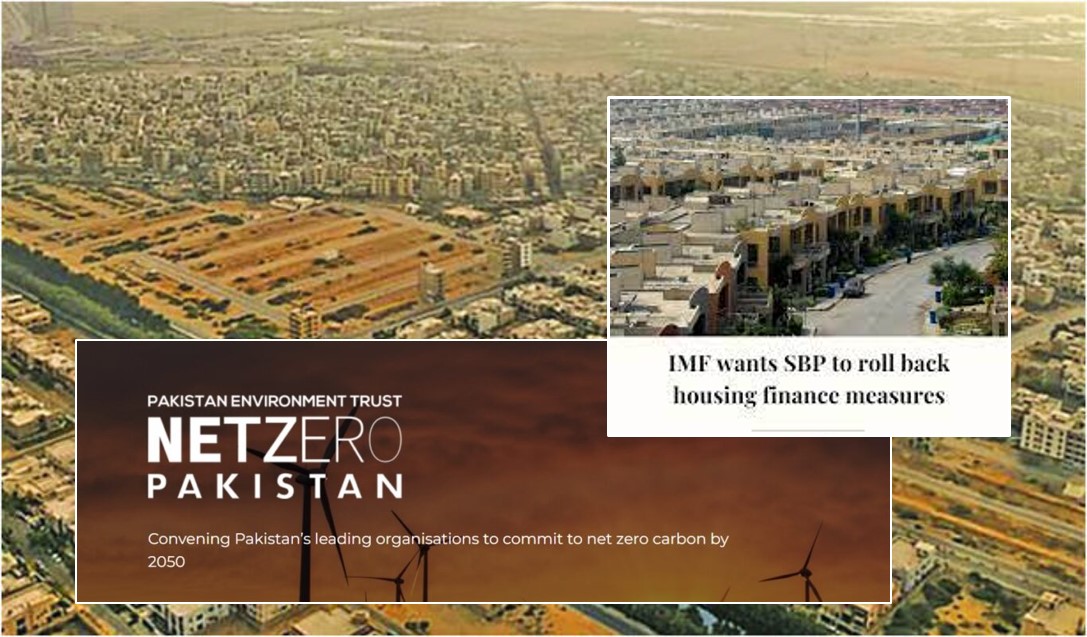13 February 2022
IMF asks Withdrawn of Housing Incentives
The IMF has asked this week from State Bank to `unwind` ongoing two key measures for the promotion of housing and construction activities in Pakistan. In July 2020, the SBP made it mandatory for banks to increase their share of lending portfolios for housing and construction sectors to 5% by December 2021. Besides the SBP changed capital adequacy regulations in June 2021 to lower the applicable risk weight to 100% from 200% on banks` investments in REITs or real estate investment trusts. The IMF has urged the Stae Bank to wind down above measures declaring them `out of concerns for financial stability`. `Banks housing lending targets could present risks to financial stability and entail a misallocation of credit,” the lending institution says. If implemented, the rollback of incentives for construction and housing can hurt the demand for cement, glass, steel and tiles.
Net Zero Pakistan Collaboration
Net Zero Pakistan, a national collaboration between pioneering companies, public institutions, and sectoral experts has been announced as an official Accelerator of the UN-backed Race to Zero campaign. That aims to deliver the goal of net zero carbon for Pakistan by 2050. Launched in August 2021, it`s the first region-wide initiative from the Global South to be recognised under this platform. So far, 22 companies, which collectively contribute 15-20% to the country`s exports, have signed up to Net Zero Pakistan.
Net Zero Pakistan seeks to provide a host of benefits to its members by enabling the transition to sustainable renewable energy, boosting export quality, capping indus-trial pollution and making the local economy sustainable as a whole. The coalition also aims to mobilise $1 billion of catalytic finance to drive industrial decarbonisation, enable companies to demonstrate their sustainability credentials to global buyers, as well as nurture a good environment for effective climate policy action.
Judiciary orders Demolition of Wedding Halls in Korangi
The Supreme Court has ordered this week demolition of over 35 wedding halls on Korangi Road as it held that these structures were built on the land meant for residential purposes. Dismissing two applications moved by the owners of the wedding halls, situated near Korangi Crossing, against its earlier orders the apex court ruled that the land was liable to be reverted back to its original residential use.
A three-judge bench headed by then Chief Justice of Pakistan Gulzar Ahmed and comprising Justice Ijaz Ul Ahsan and Justice Qazi Mohammad Amin Ahmed had reserved the order on the applications last year. The order, authored by Justice Ahsan, said that the wedding halls were built upon residen-tial plots and encroached land and liable to be demolished in terms of the earlier orders of the apex court.
KWSB withdraws from Hydrant Proposal for Kemari
The Karachi Water and Sewerage Board has finally shelved a controversial plan that envisaged setting up of a water hydrant in Saadi Town to meet the requirement in Keamari after it attracted strong criticism from political and social circles. The KWSB had issued a tender notice seeking bids for setting up a hydrant in Saadi Town a fastgrowing housing scheme in Scheme 33 stating that the facility would provide water via tanker service to residents of Keamari.
The critics questioned the logic behind setting up the hydrant for catering to the water needs of hundreds of thousands of residents of one locality by depriving people of another area. And, also questioned over the proposed facility for a densely populated area at a place more than 30-kilometre away from it. Following strong protests by the people the KWSB has call off the move.


